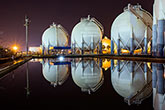Port of Rotterdam throughput falls
Published by Francesca Brindle,
Editorial Assistant
Tanks and Terminals,
Throughput of freight in Rotterdam fell in 2016 by 1.1% to 461.2 million t. The fall can largely be attributed to dry bulk such as ores and coal. Liquid bulk managed to hold on to the high level reached in 2015. At the time the sector was growing by overt 10%. Last year, 1.2% more containers (TEU) were handled.
Allard Castelein, CEO Port of Rotterdam Authority, “After exceptional 4.9% growth in 2015, we have to be content that most sectors have been able to equal or even slightly exceed these volumes in 2016. The Rotterdam port and industrial complex is facing huge challenges, in particular digitisation and energy transition as well as stiff competition from surrounding ports. Divergent trends provide reassurance that the complex can handle these challenges, such as the major investments in various refineries, a number of projects that should shape energy transition and the new container line sailing schedules that are favourable to Rotterdam.”
Paul Smits, CFO Port of Rotterdam Authority. “With turnover remaining virtually the same and increased profit thanks to good cost management, 2016 was, from a financial viewpoint, a healthy and stable year. Investments rose by 16% and they are at least expected to be comparable to 2016 levels over the next few years. At the same time the Port Authority is obliged to pay corporate tax from 2017 onwards. We shall not allow our clients to suffer as a consequence, so we shall be focusing strongly on our costs.
Liquid bulk
Throughput of crude oil fell by 1.2% to 101.9 million t. Although refinery margins fell slightly, they remained buoyant whereby the level of crude oil input stayed at the upper end of the historical spectrum. Following a rise of 18.0% in 2015, the input and output of oil products increased by a further 0.3% to 88.8 million t. There was less throughput of fuel oil but more gas oil, diesel, kerosene, petrol and naphtha was handled. Throughput of LNG dropped by 26.1% to 1.7 million t following an increase of over 90% in 2015. The reason for this that in 2016 the global market saw less arbitrage relating to LNG prices. The other liquid bulk category rose by 1.5% to 31.2 million t. This is a sum of different types of cargo. For instance more biodiesel was transhipped but less palm oil. In total the amount of liquid bulk fell by 0.5% to 223.5 million t.
Forecast
The Port Authority expects throughput volume in 2017 to remain at a comparable level to that of 2016. Container handling is expected to continue on an upward trend. It is uncertain whether the other sectors will equal the 2016 results.
Read the article online at: https://www.tanksterminals.com/storage-tanks/13022017/port-of-rotterdam-throughput-falls/
You might also like
SK Gas LNG terminal starts trial run
SK Gas's South Korea LNG Terminal in Ulsan has started its trial run in collaboration with the Korea National Oil Corp.

